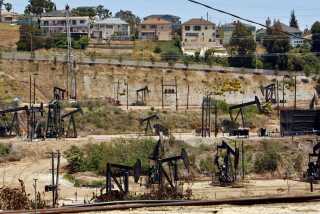ENERGY SQUEEZE / WINNERS AND LOSERS : Texas Oil Patch Cautiously Optimistic, Not Gloating : As cost of crude soars, so does demand for drilling rigs. But industry wants stable prices, somewhere near $25 a barrel.
- Share via
MIDLAND, Tex. — It’s foot-tapping time here in Midland. Time to smile. Time to head on down to the Petroleum Club and talk about the oil bidness .
The price of oil is shooting through the roof, and it’s drilling time. There is so much demand for oil rigs that they are being reserved months in advance.
“Everybody is about booked up for the year,” said Don Laxton of FWA Drilling. “We’d run them all if we had enough hands.”
True, there is also a note of caution about this city, whose prosperity, or lack thereof, is largely dependent on the price of a barrel of oil. No one in this Oil Patch town in the Permian Basin is going to declare that life is much improved just yet, even though the price of crude oil has already surged above the $40-a-barrel mark. There’s a little waiting to be done first to make sure that the price is going to stabilize. Somewhere around $25 a barrel would be fine for the folks here.
“People are not drunk on that,” Janet King of the Midland Chamber of Commerce said. “People have been sobered by the bust of the ‘80s. There’s a lot of humility and caution here.”
But, still, the mood of the place hasn’t been like this for a long, long time.
“We’re very optimistic,” said Barry Smith, the general manager of the downtown Hilton Hotel--where, during the dark days of the oil bust, the gourmet dining room was closed for lack of demand. “People are dining out more. There’s more traveling, more meetings going on.”
And, he said, there are a lot more people coming to town and renting rooms at his hotel. “There seems to be a lot more planning for next year,” he said.
Over the last several weeks, the salary for roughnecks has jumped from $8.90 to $10 an hour. But there aren’t many qualified oil workers, so severe were the cutbacks during the ‘80s, when oil prices dipped below $10 a barrel.
“We’ve got every person on the payroll out there working,” said Steve Todt, whose Cactus Drilling is able to run only nine of the company’s 29 oil rigs because of the personnel shortages. “I hate to see it (the Iraqi invasion of Kuwait) happen, but it’s good for this part of the country.”
The mood hereabouts is a far cry from, say, 1984, when sagging oil prices and a mountain of unpaid energy loans caused the closing of First National Bank, the city’s largest. The bank’s $1-million art collection, one of the prides of the city, had to be sold at auction. A signed Norman Rockwell print went for only $3,250.
That was a dark day for Midland, and there were darker ones to come. The highway leading out of the city, once lined with oil field equipment, is now largely a collection of vacant lots. Drilling equipment is in demand and thefts are on the increase in the Oil Patch.
At a time when there is an inkling of prosperity in Midland, there is also an effort not to thumb a collective nose at the rest of the country, particularly New England, which seems destined for a difficult and expensive winter if the price of heating oil increases dramatically.
“Most guys here are gritting their teeth about New England and the fuel oil costs,” said Harry Spannus of the Permian Basin Petroleum Assn. “We don’t set the prices. We don’t have anything to do with setting the prices. The American people point the finger at the oil and gas people, but it’s not us.”
The refrain that is heard most often, though, is the need for the United States to have some sort of energy policy in which the price of oil is stabilized through regulations, stopping wild swings in the market.
“We have no consistency in our business. It’s either feast or famine,” Todt said. “If we had the (pumping) capacity we had in 1980 and 1981, oil prices wouldn’t be nearly as high.”
More to Read
Sign up for Essential California
The most important California stories and recommendations in your inbox every morning.
You may occasionally receive promotional content from the Los Angeles Times.













